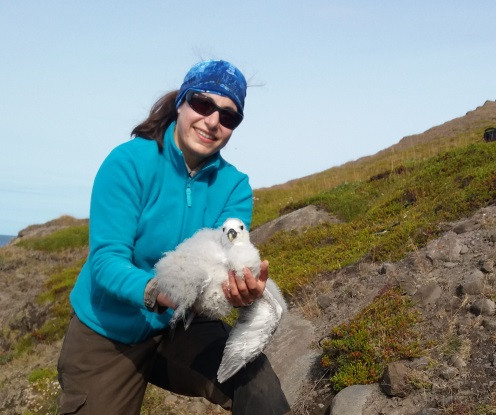- Research
- Fish tagging
- Lumpfish research
- Oceanography
- Seabed mapping
- Arnarfjörður
- Drekasvæði
- Ísafjarðardjúp
- Jökulbanki
- Jökuldjúp
- Kolbeinseyjarhryggur and adjacent area
- Kolluáll
- Langanesgrunn
- Látragrunn
- Nesdjúp
- Reykjaneshryggur and adjacent area
- Selvogsbanki
- South of Selvogsbanki
- South of Skeiðarárdjúp
- South of Skerjadjúp
- Southeast of Lónsdjúp
- Southwest of Jökuldjúp
- Suðausturmið
- Suðurdjúp
- Vesturdjúp
- East of Reykjaneshryggur
- Vestfjardarmid
- Seal research
- Whale Research
- Advice
- About
Nina Dehnhard delivers a lecture at MFRI
15. January 2018
 Photo: https://ninadehnhard.wordpress.com/
Photo: https://ninadehnhard.wordpress.com/
Dr. Nina Dehnhard will give a lecture at MFRI on January 18. The lecture will be held in the 1st floor auditorium at Skúlagata 4, and will commence at 12:30 pm.
Abstract
How does environmental variability affect foraging behaviour in Southern Ocean seabirds?
Global climate change is predicted to – along with many other effects – cause increasing air and ocean temperatures, changes in wind patterns and a decline of sea ice in the polar ecosystems. The ability to cope with environmental variability will be crucial for organisms to adapt and survive these predicted and already happening changes in the environment. Seabirds are long-lived, slowly reproducing animals and therefore have a slow evolutionary adaptation rate. They already now form one of the most-threatened taxonomic groups of birds in the world and climate change might present a large challenge to some seabird species. In the first part of my presentation, I will show results from my doctoral thesis and first post-doc on southern rockhopper penguins (Eudyptes chrysocome chrysocome). I will present data on how environmental variability affects the diet, space use and foraging success of this species. In the second part of my presentation, I will show my most recent results about the foraging behaviour and diet of three species of Antarctic fulmarine petrels (Antarctic petrel Thalassoica antarctica, Cape petrel Daption capense and Southern fulmar Fulmarus glacialoides), and the environmental conditions that shape foraging areas of these sea-ice adapted species.
Dr. Nina Dehnhard studied Biology with the focus on biological oceanography at the University of Kiel (Germany) and the James Cook University in Townsville (Australia) and obtained her Diplom in 2009. She did her PhD at the Max Planck Institute for Ornithology / University of Konstanz (Germany), studying the effects of environmental variability on foraging behaviour, physiology and survival of southern rockhopper penguins in the Falkland Islands. After defending her PhD in 2013, she continued to work on southern rockhopper penguins during her first post-doc (1-year) at the University of Antwerp (Belgium), analysing the effects of environmental variability on the timing of breeding and investment into breeding. During her second postdoc (3 years), also at the University of Antwerp and in collaboration with the Australian Antarctic Division (Hobart, Australia), Nina visited Antarctica to study the foraging behaviour of Antarctic fulmarine petrels. In 2017, she secured funding to start a new project on the foraging behaviour of northern fulmars in Iceland.
More info: https://ninadehnhard.wordpress.com/
